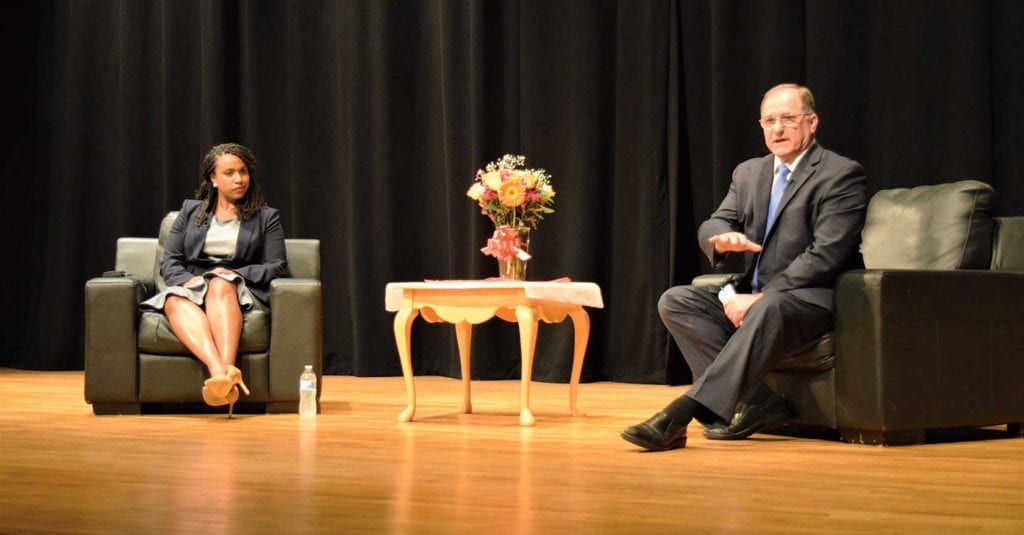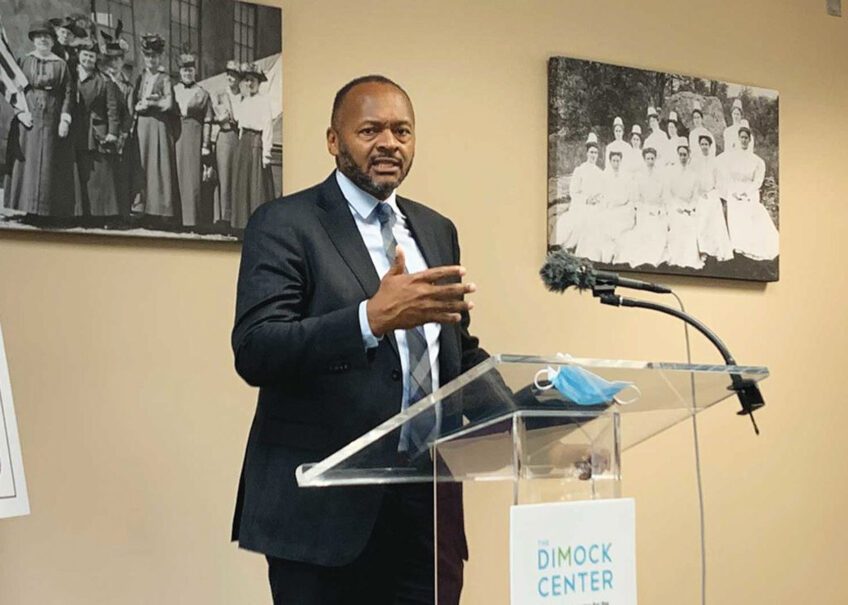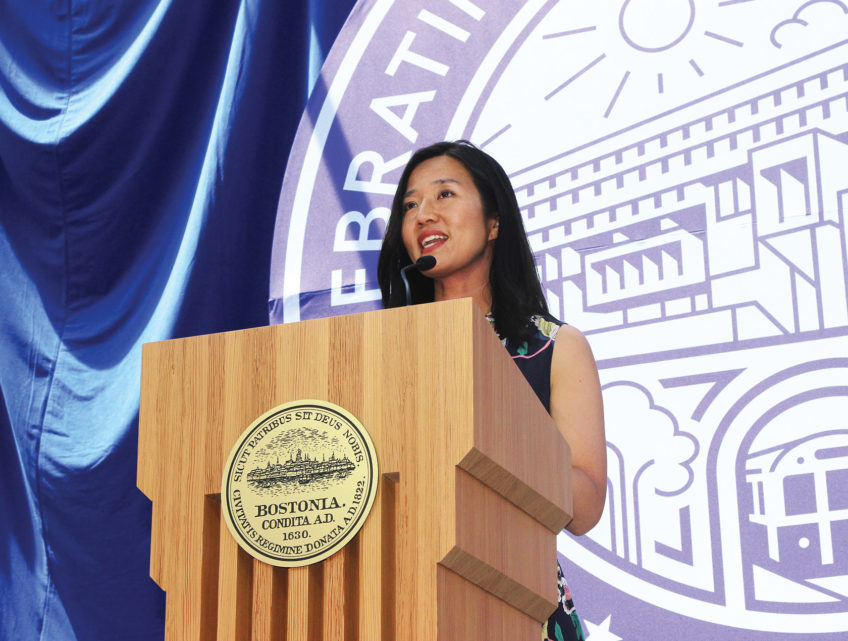
At-large City Councilor Ayanna Pressley faced off against 7th Congressional District Rep. Michael Capuano at a forum on racial justice issues last Friday.
Hosted by Roxbury Community College and moderated by Suffolk County Sheriff Steven Tompkins, the debate was a chance for voters to distinguish between the two progressive candidates with similar platforms.
While Capuano cited his nearly two-decade long record as a U.S. representative and his perfect rating from the NAACP, Pressley dove deep into the nuts and bolts of systemic and institutional racism and her work as at-large city councilor for eight years.
In her opening statement, Pressley took a personal approach by sharing her story of growing up in Chicago, raised by a single mother, whom she called her “shero,” surviving sexual abuse and never losing faith in government.
She succinctly summarized the state of the 7th Congressional District and how she plans to serve it in Congress. “It is the most diverse district but also the most inequitable district,” said Pressley.
Capuano also addressed inequality in his opening statement and how, as former mayor of Somerville, he pushed for a Spanish-language Civil Service test and for 50 percent hiring from communities of color to “level the playing field.”
Throughout the forum, he emphasized the record he has accrued during his 10 terms in Congress, adding that his endorsements and his work in improving the Fairmount Line, which runs through many of Boston’s low-income neighborhoods, showed his commitment to racial and economic equality.
Pressley responded that she also has a record, garnering around 60,000 votes every two years and having to “repeatedly defend my record and re-enlist the voters’ confidence.”
She pointed to her leadership in liquor license reform, bringing 75 new liquor licenses to formerly disenfranchised neighborhoods in Boston, as part of her strategy in addressing complex systemic issues with sustainable solutions.
“Liquor licenses bring in foot traffic and increase economic development,” she said.
In addition, the councilor said she would continue to address the “food deserts” in certain parts of the district where there is less access to healthy supermarkets and sit-down restaurants and only fast food establishments.
The issues
Repeatedly, Capuano and Pressley agreed on almost everything including passing comprehensive immigration reform, prohibiting discrimination of transgender individuals in public places, investing in environmental justice and supporting the Black Lives Matter movement.
“What we’re doing to DREAMers and TPS holders is unconscionable,” said Capuano. “Immigration is good for us, it’s who we are and it’s good for America.”
Pressley often took a more nuanced approach to her responses.
She said in addition to providing real pathways to citizenship, she is committed to providing the resources immigrants currently need such as supporting the growth of immigrant-owned businesses, affordable or free English language learning programs and investing in emotional and social supports at schools.
“Since day one as councilor, I have believed that trauma is a barrier to learning,” she said. “Trauma manifests itself in the fallout of poverty, homelessness, displacement and fear of deportation.”
Tompkins cited a Northeastern University study that found more instances of chemical and toxic waste exposure in communities of color than in predominantly white communities in Massachusetts. He asked the candidates how they would address the issue.
“We cannot realize environmental justice without housing or economic justice,” said Pressley. “In our housing crisis, low-income residents are living in subpar conditions with mold or rodents and are unable to ask for help for fear of eviction.”
Capuano said, “Environmental justice will not get done without federal guidance, involvement and prodding to do the right thing.”
He continued, “This gets back to political activism. People like you. We need to vote for people who care about this and can deliver the goods. No one is going to come in and clean up our neighborhoods, we have to clean up our own neighborhoods, together.”
Role of government
In his statements, Capuano highlighted his belief on what the role of government should be.
“Do you believe each and every one of us should be on our own for health care, education and housing, or do you believe we should come together as a society and help each other in an appropriate way?” he said. “The people who believe you’re on your own have been running Washington for a while, and they are dead wrong.”
Pressley spoke about the importance of civic engagement during a critical time in government. “We have a choice; this can go down as the most draconian time in our history or it can go down as the time we came together and ushered in the most change-making movement in our history,” she said.
“I can’t help but be inspired by the resurrection of the women’s movement and the #MeToo movement, criminal justice reform and the conversation around gun violence prevention,” said Pressley.
Closing statements
The candidates tied up the discussion by bringing it back to racial justice in their closing statements.
“I have been able to bring people together with divergent views on complex social issues that make people very uncomfortable,” said Pressley. “I believe unless you’re willing to make people uncomfortable, you won’t achieve real progress.”
She also said, “70 percent of Boston is in the 7th congressional district. I’ve already been leading in this district on local issues of national relevance.”
She referenced her work as at-large city councilor, where she has focused on the needs of black women and girls in particular.
“These issues aren’t theoretical for me, they are lived,” said Pressley.
Capuano said that when combating racism, “We have to have these conversations to try to find common ground and find exact ways to do something about it.”
He said he has proven this cooperative strategy through his many years of working in Congress, getting 218 votes on the House floor to “get anything done” and having the “ability to know how to work with that many people with diverse beliefs and backgrounds on dozens of issues.”
“I’ve formed cooperative relationships with others who do the same,” said Capuano. “That’s what it takes to get anything done.”






